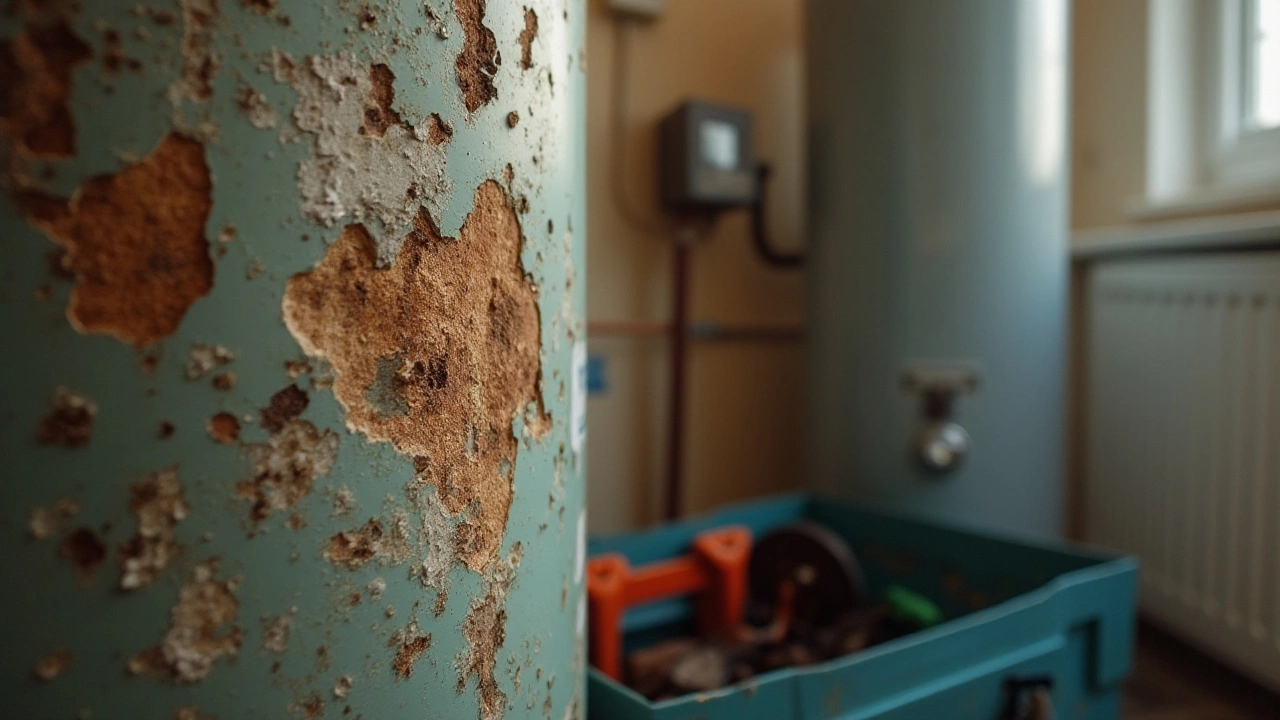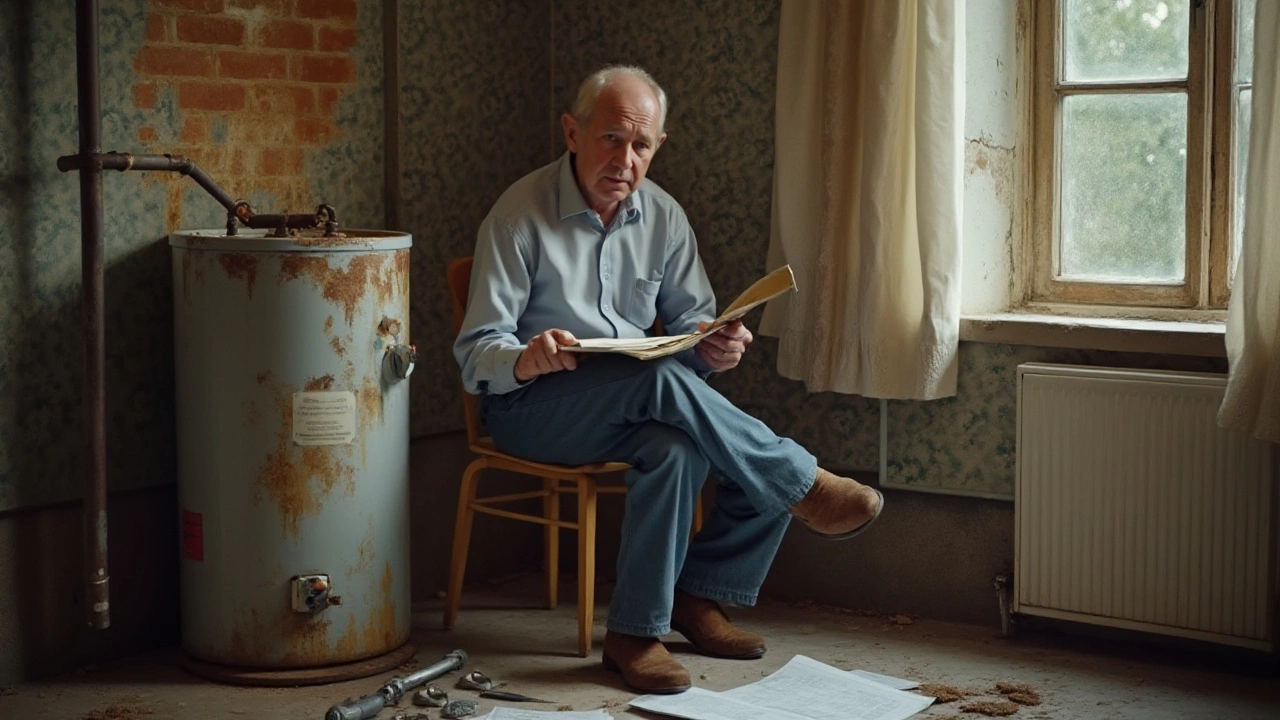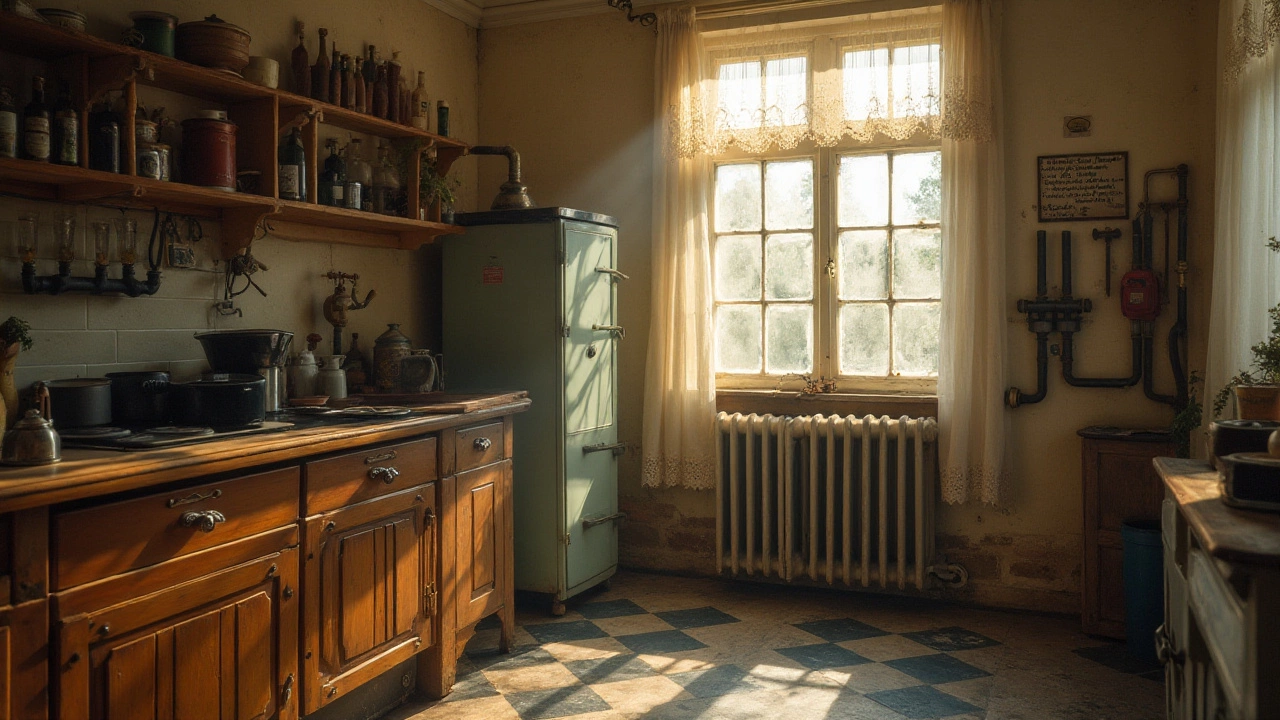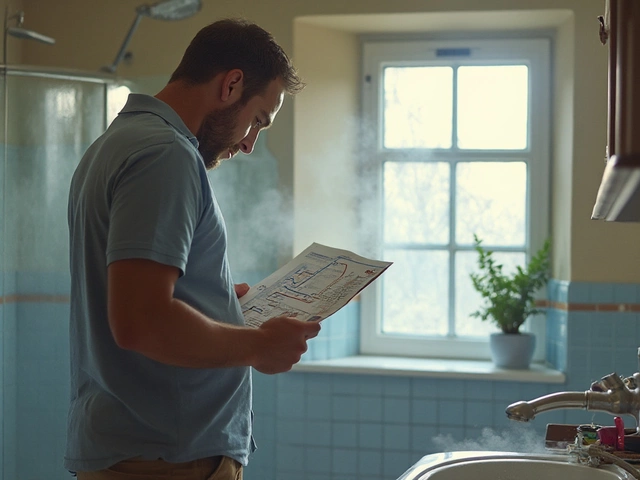Debating whether repairing a water heater that's seen two decades can stir quite the fuss for homeowners. It's a common dilemma: stick with the old faithful or invest in a new one? As water heaters grow older, they may lose efficiency, turning what was once a reliable hot shower into a lukewarm splash. While the hefty assurance of a vintage machine is tempting, understanding the true cost of repairs can be eye-opening.
Before diving into the decision-making pool, it's essential to explore the journey of these aging appliances. What quirks do they develop? And how do you gauge when the repair bills are stacking higher than a new model's price tag? Navigate the nuances of energy efficiency, assess the red flags, and arm yourself with insights to ensure your choice marries comfort with cost-effectiveness.
- Understanding the Lifespan of Water Heaters
- Common Problems in Older Water Heaters
- Evaluating Repair Costs vs. Replacement
- Energy Efficiency Considerations
- Making an Informed Decision
Understanding the Lifespan of Water Heaters
The longevity of a water heater is an intriguing journey through the annals of modern conveniences. Most conventional water heaters, be they electric or gas, typically serve for around 8 to 12 years. This life expectancy hinges on factors such as usage, maintenance, and even the water quality in your locale. It's worth noting that some tankless models can stretch out their usefulness to nearly 20 years, a testament to their evolving innovation and design. These timeframes often surprise homeowners who hadn’t considered that any appliance in their home could endure for so long without a hitch.
Every water heater has its tale — from the character-building battle scars of hard water deposits to the occasional visit from a friendly maintenance technician. As your heater ages, it begins to lose its initial efficiency, causing your utility bills to quietly climb. Issues like sediment buildup are notorious as they significantly hamper performance by insulating the water from the burner. Therefore, regular flushing is crucial in prolonging those stats. The humble anode rod, a sacrificial metal rod that protects the tank from corrosion, deserves a shout-out too. Replacing it every few years can vastly extend the life of your water heater.
For some, the trusty water heater has become a background player in the household. Yet suddenly, a cold shower may catapult it to the center stage when you least expect it. A lack of hot water is not just discomfort; it’s the water heater's way of sending out an SOS. Efficiency metrics and repair costs come into play here. According to the U.S. Department of Energy, water heaters account for about 17% of the home's energy use. So, when your old unit begins to falter, it might sting your wallet more than you realize.
"Maintenance is key to enhancing the performance and longevity of your water heater," advises John Rogers, a seasoned plumber with over three decades of experience. "No one wants to have a cold shower in the middle of winter, and keeping tabs on the state of your water heater can prevent those chilly surprises."
When pondering replacement, observing your heater's age and behavior is paramount. If repair estimates run high and the unit is close to or beyond its prime, you might consider saying goodbye. A modern heater will bring perks like enhanced energy efficiency and maybe even save you some money long term. Guide yourself by the rule of tens: if the water heater's age plus repair costs surpass $1,000, it's time to explore new options. Not only will this provide you with peace of mind, but it may also lead to an investment in your home's overall efficiency.
Common Problems in Older Water Heaters
Water heaters, much like any other home appliance, aren't designed to last forever. But when you find yourself dealing with a 20-year-old water heater, several problems can crop up as the years tick by. One of the most frequent issues is the build-up of sediment at the bottom of the tank. Over time, minerals from water accumulate and settle, forming a thick layer that causes the tank to use more energy to heat the water. This sediment not only reduces efficiency but also increases wear and tear, eventually leading to leaks or other major faults. Regular flushing of the tank can mitigate some of the damage, but for an old unit, the grime can become too stubborn to completely remove.
Another common problem is the wearing out of crucial components. An aging water heater might struggle with a weakened heating element, which reduces its ability to provide hot water reliably. The electrical parts that tell the heater when and how much to heat may fail too, risking unexpected cold showers. In older water heater models, the thermostat might lose calibration, causing inconsistent temperatures. This is particularly inconvenient in regions with colder climates where consistent hot water is an essential household need. In gas heaters, the pilot light and related components often break down, needing regular maintenance and even costly replacements.
Corrosion is another villain in the story of aging heaters. Despite protective anode rods, prolonged exposure to water can lead to rust forming inside the tank. Once rust starts eating through the tank walls, it’s often a sign your heater's days are numbered. Curious noises, like banging or rumbling, often indicate excessive sediment build-up or imminent failure. Even the exterior of the appliance can tell tales of aging mishaps, like peeling or cracking, both indicating potentially hazardous wear.
It’s worth pointing out that older units may also lack modern safety features found in newer models. The sacrificial anode rod may no longer be effective after two decades, which would make the tank highly susceptible to corrosion-related leaks. The absence of a proper pressure relief valve in an old heater could spell trouble should the water heater over-pressurize, turning it into a ticking time bomb in extreme cases.
In some instances, minor repairs may address the specific problem temporarily, but a 20-year-old heater is past the typical average lifespan of a water heating appliance, which is about 10 to 15 years. The repair costs might not justify extending the unit's life for a few more months, and it could be more financially sound to invest in a new, energy-efficient model. According to a study conducted by the Department of Energy, water heating can account for approximately 18% of a home's utility costs. Upgrading to a newer model could significantly reduce this cost, offsetting initial purchase and installation expenses over time.
"An inefficient water heater acts like a money pit," says Michelle Johnston, an energy efficiency expert from the Green Energy Council. "Replacing an outdated unit with a high-efficiency model can save as much as 20% on monthly energy bills, recouping costs within just a few years."

Evaluating Repair Costs vs. Replacement
When you're standing at the crossroads of repairing or replacing a 20-year-old water heater, digging into the numbers is the way to go. This old ally has kept your showers warm through countless chilly mornings, but maintenance hasn't been a breeze. Now, each creak and groan sounds a tad ominous. So, let's pull back the curtain to see what those repairs might actually cost and how they stack up against a shiny new model. Repair costs typically range from $100 to $600 depending on parts and labor involved. Replacing corroded tanks or faulty thermostats can spiral these costs further. Meanwhile, a modern water heater might set you back anywhere from $800 to $1500, including installation. While upfront replacement costs seem steep, constant repairs can become a bigger money pit if your trusty heater is reaching its sunset years.
Water heaters are complex appliances with varied fates. One week it’s a broken heating element, the next, a faulty ignition. Brands, model types, and regions influence repair expenses greatly, adding another layer of unpredictability. You might find out that sourcing parts for these older models is time-consuming and often without a guarantee of success. Must you desire to gamble on such odds when a new tech-savvy unit awaits? Add the unavoidable energy efficiency loss with age, and the scales tip towards replacement. This lost efficiency can sneakily add $100 or more yearly to your energy bills. Understanding these nuances can make a seemingly overwhelming decision more straightforward.
You might wonder if you're alone in facing these choices. According to Angela C. from Consumer Reports, investing in a new water heater often aligns with longer-term financial sense.
"When a 15- to 20-year-old water heater begins developing faults more than once a year, it usually means replacement makes more financial sense," Angela says. "Look at it as an opportunity to upgrade to a more efficient model."For true insight, weigh the ongoing repair expenses against the lump sum for a replacement. Consider how often issues arise and the potential increase in electric or gas bills due to an aging system’s inefficiency. Then, the solution might just present itself in a brand new unit humming along happily in your utility room.
There's also a peace of mind factor beyond raw numbers. Old faithfuls might work for now, but what if an unexpected failure leads to flooding or severe property damage? Such risks are mitigated with a replacement. Newer models come with warranties that cover parts and labor for extended periods, offering both protection and predictability. And, enhanced energy efficiencies keep those utility bills at bay. Assessing these aspects thoroughly, you could find replacing your well-aged water heater is not just a choice of financial prudence but of lifestyle elevation too.
Energy Efficiency Considerations
Exploring energy efficiency is like peeling back fresh layers of potential savings and improved performance, especially when dealing with a water heater that's clocked in at two decades. A key player in household energy consumption, water heaters typically account for about 17% of energy usage, making their efficiency a critical financial and environmental concern. As carbon footprints loom large in today's world, a heater's thirst for power can't be ignored. Older units, while built tough, may guzzle more electricity or gas than their modern counterparts, translating into heftier bills that mount silently over time.
The heart of the matter lies in how effectively these older units convert energy into heat. Newer models brim with technology aimed at optimizing every ounce of energy, while aging units may struggle to keep up. Consider that innovations over the past couple of decades have introduced tankless models and hybrid versions designed specifically for reduced energy expenditure. The Energy Factor (EF) rating emerges as a guiding compass in this context; newer units boast impressive EF scores that older ones can't match. For every degree that an older water heater heats inefficiently, those pennies add up—making upgraded energy efficiency enticingly attractive.
Switching from an old unit to an efficient one might sound expensive initially, but the rewards ripple out in the form of savings on utility bills. Imagine being able to slice your water heating costs by up to 50%—a feat achieved by many energy-efficient models available today.
According to the U.S. Department of Energy, "replacing a water heater that's more than 10 years old with a certified ENERGY STAR model can result in nearly $3,500 in lifetime savings on energy costs."Such shifts not only ease the burden on your wallet but also contribute to a greener planet, slashing CO2 emissions alongside those bills.
It’s also worth considering the various programs and rebates offered by governments and utility companies to encourage the shift toward high-efficiency appliances. These incentives can further mitigate the cost of upgrading to a modern unit. Pair that with the lower operating costs and enhanced reliability, and suddenly the notion of clinging to a 20-year-old model might seem less appealing. Take time to evaluate potential savings, think of the environmental impact, and imagine the possibility of embracing the newer technology that current models display. In a world that tirelessly seeks sustainability, an efficient water heater repair or replacement decision today is an investment in tomorrow's cleaner energy landscapes.

Making an Informed Decision
Deciding whether to repair or replace a two-decade-old water heater is no small task. It's a crossroads many homeowners face, and the stakes involve practicality, finances, and comfort. At this age, a water heater is living on borrowed time. Most manufacturers estimate about 10-15 years of service life. Therefore, if your unit has hit or exceeded this milestone, it's wise to evaluate it critically. The appeal of repair often lies in lesser immediate costs and the comfort of the familiar, yet, understanding the broader picture is crucial. Every repair potentially patches one leak but leaves room for another. Efficiency and reliability often diminish as the years stack up, leading to negligible water savings and increasing repair needs.
Begin by assessing the frequency and nature of past repairs. If your heater has undergone several fixes in the recent past, especially for major components like the heating element or gas valve, it's a hint that future breakdowns may not be far behind. Add to this the potential inconvenience of untimely breakdowns in the middle of a freezing night, and the cost of repeated repairs may dwarf what you would invest in a new, reliable model. Modern water heaters offer improved technologies and efficiency, frequently saving you money on utility bills in the long run.
Next, weigh in on your current household needs. If, say, a once-young family has grown and demands more from their heater than ever, older models might struggle to keep pace. Newer units might boast a greater capacity or innovative features like smart technology integration, setting themselves apart in energy savings or hot water delivery. On the energy efficiency front, Energy Star-rated models are worth a mention. Transitioning from an older model to a high-efficiency one can lead to about 10-20% savings in energy consumption over time. This transition not only aids your wallet but is kind to the planet.
The cost-benefit analysis might become more transparent with a straightforward calculation of repair expenses versus replacement costs. A rule of thumb suggests if a repair costs you more than half the price of a new heater, it's a sensible pivot towards replacement. Add in the potential rebates or government incentives often associated with efficient models, further easing initial investments. An electrician's or technician's evaluation on the overall state can illuminate unforeseen issues that a layman's eye might overlook, saving future woes.
According to Matt Schuele, an energy expert, "An older water heater can remain operational beyond its expected lifespan, yet at a much steeper operating cost."Such insights may instill the urgency to alter course, aligning with the future rather than grappling with a tangled past. Ultimately, making an informed decision on your water heater involves a mix of foresight and practicality. Keep in mind your future plans. If you intend to remodel or expand your home, incorporate these into your decision-making. A new model tailored to future demands could be a savvy choice. In essence, a new beginning – even with an appliance – sometimes turns into not just a smarter, but a more enjoyable journey.





